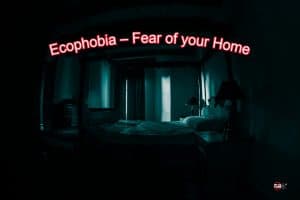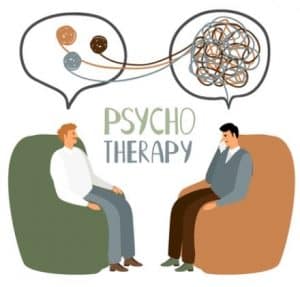Share This Article
Home Sweet Home, Not for Everyone
Typically, when you think of home, you think of a safe space where you live. Unfortunately, for some, a home is the exact opposite. Rather than a place of safety and security, one’s home becomes a place of terror.
This fear of one’s home is called ecophobia.
Ecophobia causes unexplainable anxiousness when one thinks about going home or being at home. For some, the home itself ends up as simply a place to store personal items, because they cannot bear to be there.
It’s a challenge to explain why the familiar living room, bedroom, or kitchen is the last place you want to be while everyone around you finds comfort at the prospect of home.
The good news is that there are ways you can deal with this phobia and eventually overcome it. First, educate yourself. Try to discover why you have this fear, and then work through the steps to alleviate symptoms.
Let’s read on.

What Is Ecophobia?
The irrational fear of home or home surroundings is called ecophobia, also referred to as oikophobia.
Fear of one’s home surroundings may cause you to avoid going home. You may find that you prefer being anywhere else but your home. You may have a nagging feeling that being home may bring you harm, or perhaps you fear something unpleasant will happen.
You may find yourself making excuses for why you’d rather spend your time elsewhere, or you might even start living as a nomad. Some may feel they would rather not have a permanent address that ties them down to a specific space.
Ecophobia can cause you to be away from home as much as possible. This fear escalates when you are physically present within the house and may even lead to panic or anxiety attacks.
As one can guess, this form of phobia may eventually negatively impact one’s social relationships with family and those they grew up with. At some point, it might even affect one’s career.
Ecophobia Causes
Like most phobias, there is no specific cause for ecophobia. However, there are a number of factors which may trigger such a fear.
Generally, the causes for ecophobia can be classified into two groups: biological and environmental.
Biological Factors
Genes play a major role in determining whether a person might develop phobia.
If anyone in your family has a history of mental illness, anxiety, or phobia of any sort, it increases the probability of you developing a phobia, including ecophobia. This genetic tendency for developing phobias or mental disorders is called diathesis-stress relationship.
Environmental/Experiential Triggers
If one already has a genetic predisposition for developing mental health disorders, a traumatic event may trigger ecophobia.
This event can be a traumatic experience one had while growing up that carries into adulthood. If a person was afraid of their parents or was subjected to violence and aggression when they were young, it can create an association between one’s home and negative feelings, eventually resulting in ecophobia.
Ecophobia may also develop if one feels threatened and unsafe in their house. Again, there are many possibilities why one may feel and think this way. It could result from a traumatic incident one has witnessed or was subjected to. A break-in, a fire, an abusive relationship, or countless other personal and traumatic events could leave you scared of your own home.
Other environmental factors such as natural disasters and calamities can also instill fear in a person. Some may fear their house may be destroyed by a tornado or fear being trapped inside during a housefire.
Symptoms of Ecophobia
What symptoms one may experience with ecophobia will depend on how severe the phobia is. While some may only feel a slight discomfort at the thought of being home, others may experience hyperventilation or panic attacks.
Here are the common symptoms of ecophobia:
Physical Symptoms
- Cold sweat
- Dry mouth
- Fainting
- Increased heartbeat
- Gastrointestinal distress
- Nausea
- Numbness
- Shaking
- Shortness of breath
- Smothering sensation
- Tightness in the chest
- Tingling sensation
- Vomiting
Psychological Symptoms
- Varying levels of panic
- Irrational thoughts of losing control and embarrassing yourself
- Not being able to think or speak logically
- Thoughts about being harmed and dying
- Wanting to cry or give in to the fear
How Do You Deal with Ecophobia?
Depending on the severity of one’s ecophobia, it can eventually take a toll on one’s life and relationships.
One of the most important things to address when dealing with any phobia is to manage the anxiety and depression that may result from it. Besides, the more you try to escape your fear, the more intense it becomes. This can lead to more unhappiness and anxiety.
Like any other irrational fear, ecophobia can be dealt with in numerous ways. There are various options available today when it comes to treating a phobia.
Remember, your home should be your territory, so let’s face the fear of your home before it consumes you.
Ecophobia Treatment
Most people outgrow their fears. However, when it comes to phobias or irrational fears, these fears can worsen with time and become increasingly disruptive if left untreated.
If you believe you have ecophobia, consider the following treatment options.
Self-Help Methods
Understanding your fear is the first step toward overcoming it. It is also one of the hardest but most important steps of self-help.
It’s important to understand, however, that this is not an overnight process. You’ll have to put in the effort and take the steps needed to deal with ecophobia.
Reflection can be helpful. So, let’s begin with the following questions:
- Do I have anything to be afraid of?
- What’s the worst that can happen to me in my house? How will I handle it?
- On a scale of 1-10, realistically, how likely is my fear/anxiety to materialize?
- Based on my past phobia attacks, did anything negative happen to me?
- Do I want to be free of this phobia?
Keep visiting these questions and write down your answers. Remember, it’s acceptable to have different answers in the beginning. But once you become more confident, your answers may evolve, and you may eventually be able to transcend the fear.
Calming activities like meditation and journaling can also be helpful when dealing with anxiety.

Professional Treatment
If you believe your ecophobia is too severe to deal with on your own, seeking professional treatment from a licensed therapist can be a good way forward.
Typically, the therapist will ask you to share your fears in-depth before they recommend the best treatment method for you. Some of the standard therapy treatments for phobias include neurolinguistics programming, exposure therapy, mindfulness-based stress reduction, cognitive behavioral therapy, and systematic desensitization therapy.
Coping with Ecophobia
Living with a phobia such as ecophobia can be one of the hardest things to do, but don’t let that stop you from trying to make progress.
It’s vital that you work to empower yourself. Seek the treatment you need to manage your fears with confidence. It is possible to reach that point where going home feels welcoming rather than causing you distress.
In Conclusion
It’s good to have a place to call home. Feeling safe and comfortable in our space is part of a happy life. Don’t let an irrational fear of home take that away from you.
With the right treatment and self-help methods, you can overcome this phobia and have a safe haven of your own.



